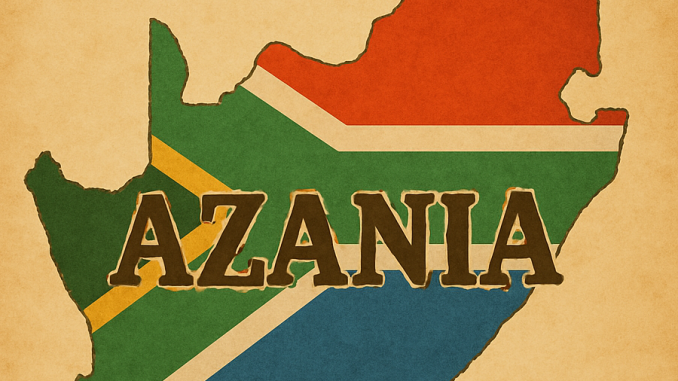
South Africa is once again at the centre of a heated national debate after the African Transformation Movement (ATM) formally proposed changing the country’s name to the Republic of Azania. This proposal, put forward by ATM president and parliamentary leader Vuyo Zungula, has ignited a conversation about identity, history, and the post-apartheid nation’s relationship with its colonial legacy.
Zungula argues that the name “South Africa” is a relic of colonialism, imposed in 1910 when the Union of South Africa was established under British and Boer authority. According to him, the name does not reflect the indigenous heritage or the historical identity of the country’s people, and thus, renaming it to Azania would be a symbolic step toward reclaiming dignity and asserting sovereignty.
The proposed name, Azania, has a complex history. Although it appears in ancient Greek and Roman literature as a term referring to parts of the East African coast, it was revived in the 20th century by anti-apartheid movements like the Pan Africanist Congress (PAC) and the Azanian People’s Organisation (AZAPO). It became a symbolic name representing the vision of a liberated, African-led future.
Supporters of the proposal argue that changing the name would reflect a decisive break from the colonial past and resonate with the values of freedom, unity, and indigenous pride. They believe it is a way to further decolonize South Africa, not just in governance and policy, but in its national identity.
However, the proposal has not gone unchallenged. Critics, including political analysts such as Kenneth Mokgatlhe, argue that the name “South Africa” is geographically descriptive and not inherently colonial. They point out that many other countries, like South Sudan or North Macedonia, carry names that are geographic in nature and do not diminish their sovereignty. Furthermore, Mokgatlhe and others question the cultural authenticity of “Azania,” noting that it has limited roots among South Africa’s diverse indigenous languages and communities. They argue that it is mostly used in academic or radical political circles and lacks broad-based resonance among ordinary citizens.
Practical concerns have also emerged. Changing the country’s name would trigger sweeping legal and administrative changes ranging from rewriting the Constitution and updating passports, ID documents, and signage, to revising international treaties and rebranding national institutions.
These changes would come at a significant financial cost, potentially running into billions of rand, raising concerns at a time when the country is grappling with high unemployment, energy crises, and economic inequality. Additionally, the legal process for renaming the country is a daunting one. It would require a constitutional amendment under Section 1 of the Constitution, which involves securing a two-thirds majority in the National Assembly, approval from six of the nine provinces in the National Council of Provinces, and extensive public consultations. As a smaller party without majority influence in Parliament, ATM faces considerable political obstacles in moving the proposal forward.
This initiative is part of a broader constitutional agenda that ATM has presented to Parliament’s Constitutional Review Committee. Alongside the name change, the party is pushing for constitutional amendments that would redefine rights as applying strictly to “citizens” instead of “everyone,” limit judicial authority in favour of parliamentary supremacy, introduce stricter land reform measures, including banning foreign land ownership, and ensure national control over the country’s mineral wealth. While these proposals have stirred some interest, they have also sparked concern about their implications for human rights, governance, and economic stability.
Among the public, reactions are sharply divided. On one hand, there are citizens and activists who believe the name Azania would represent a long-overdue step in healing historical injustices and affirming a more authentic African identity. On the other hand, many South Africans are sceptical about whether a symbolic change like this would bring tangible improvements to daily life, especially given the pressing socio-economic challenges the country is currently facing.
The idea has taken root in some circles, particularly among those who view the post-apartheid order as still insufficiently decolonized. But it has also been dismissed by others as impractical and disconnected from the urgent needs of ordinary people.
While the odds of the proposal passing are currently slim, it has succeeded in sparking a meaningful and widespread conversation. Whether or not South Africa ever becomes Azania, the discourse reflects deeper questions about who gets to define national identity, how history should be remembered, and what it truly means to belong in a post-colonial African democracy.

Leave a Reply